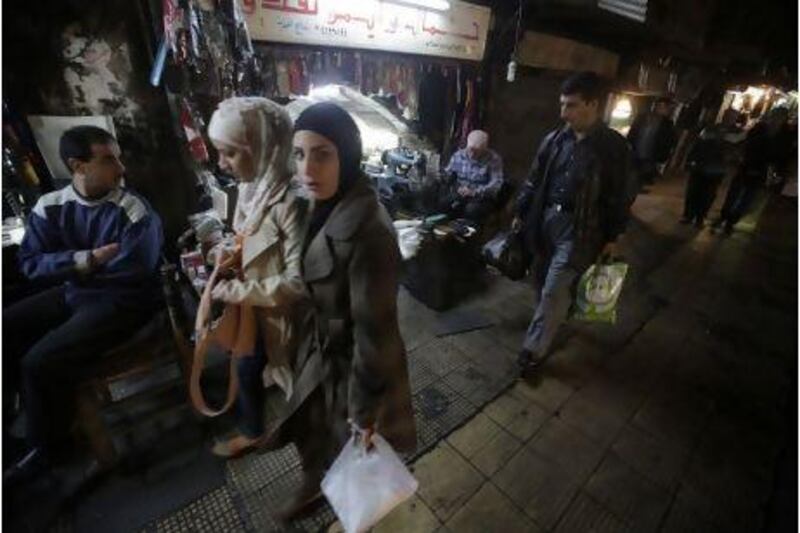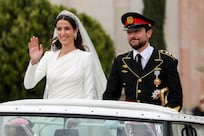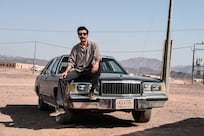At the greengrocers, food supplies are a little low but not too bad - a few remaining carrots, three heads of sad-looking broccoli, a handful of tomatoes, the skins of many of them tinged black with rot.
However, there are two large sacks of fresh potatoes and some sweet potatoes, still smudged with the dirt they grew in, plus onions, bananas, apples, oranges and peppers. In a broken fridge is a small box of pristine white mushrooms.
A large woman in a black headscarf buys half a dozen bags worth of fruit and vegetables and complains when told the price. She makes the grocer add up the bill again to be sure.
He does so with an elaborate courtesy, plugging the numbers into his calculator, and evidently resenting the implication he's trying to rip her off. She's unhappy too, certain she's being cheated. The new total is the same as the old total.
Such exchanges have become daily occurrences in Damascus and its suburbs, where about 3 million people live. Prices change on a daily basis in the capital and elsewhere in Syria - usually upwards, of course - and it is a permanent source of tension and difficulty as families on fixed incomes struggle to make ends meet.
The woman pays, handing over a green and white 1,000-lira note, which bears the portrait of former president Hafez Al Assad. In the early days of the upheaval, that cash, once worth more than US$20 (Dh7.24), would have bought too many greens for one person to reasonably carry, enough to sustain a small family for a week. Now worth about $11, it buys enough for a few days.
The greengrocer and I talk briefly as the vegetables are weighed.
"Things are dangerous these days," he says, and the words have barely left his mouth when a series of explosions sound in the distance - the bang of artillery shells hitting the southern suburb of Qadam.
It is followed by the wail of a car alarm, set off by the change of air pressure when the shells are fired close enough. These days, they have been going off a lot.
Usually cheerful and friendly, making jokes about this or that, the grocer is apparently not feeling so lighthearted. It has been a strained few weeks, with the fighting intensifying around Damascus.
He usually has the news showing on a TV in the corner, but today, for the moment at least, it's switched off.
On the way to the greengrocer I pass a man, who, with the help of two friends, is rescuing a cat stuck in a tree. Their wooden ladder is too short, so to make it reach they've put it on the roof of a single-storey building and from there, he's reached the top of the conifer to get the cat.
It is an overcast day and a strong, cold wind is blowing, making the whole enterprise even more precarious. There are sounds of shellfire coming from the next district over, a few kilometres to the east.
The man climbs down one-handed, holding the cat, which is complaining loudly.
When he arrives back on the roof he sits, smiling, with the animal on his lap, calming it down. The rescuer is broad-shouldered, with a thick black beard, a leather jacket and a red-and-white kaffiyeh wrapped around his head. He wouldn't look out of place in a photograph of a battle scene elsewhere in the country, posing with a gun.
Much of Damascus seems to be on the move these days, a sort of permanent transience marks the city. People come and go all the time, and are ready to leave whatever place they are in at short notice, pushed by fear and the search for safety.
Often they depart early in the morning without a word to their neighbours, who wake up to find the person they have lived beside for years didn't trust them enough to mention their plan. Better just to go and then explain later, if explanations prove necessary.
A few streets away from the shops, I pass yet another small Hyundai van overloaded with furniture. It is parked and people are busy moving their belongings into a new home. A couple of mattresses, an old-fashioned oil lamp, blankets and suitcases. Standing with the van are two security men wearing camouflage trousers, rifles in hand.
A little further up the road are a few relatively expensive cars - certainly by ordinary Syrian standards - a Jaguar saloon, an almost new German SUV, a sporty little metallic blue Citroen hatchback, all with flat tyres and coated with dirt and autumn leaves from the trees that line the streets.
They've not moved for months, their owners either deciding not to drive such fancy vehicles to avoid being kidnapped or - much more likely given their state of utter disrepair - they've just left the area entirely and abandoned the cars.





